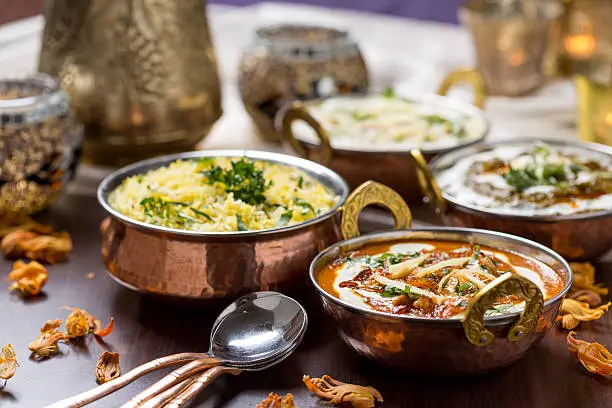Information regarding famous and authentic delicious food of India across every States all through the nation and their years of legacy
An Indian Culinary Adventure: A Tapestry of Tastes
India, a country with many different customs and civilizations, has a rich culinary history. Indian food delivers a symphony of flavors that entices the palette, from the spicy curries of the North to the delicate aromas of the South foods

Andhra Pradesh: Known for its fiery and savory cuisine, Andhra Pradesh provides a variety of sea food specialties, biryanis, and curries. A must-try is Hyderabadi Biryani, a flavorful rice dish topped with spices and meat.
Kerala: Light, nutritious foods are bursting with flavorful spices, Kerala d coastal flavors. A popular delicacy is appam and stew, which is a decuisine is renowned for its distinctive fusion of Ayurvedic anlicate pancake paired with a curry made with coconut milk.
Tamil Nadu: With an emphasis on vegetarian cuisine, Tamil Nadu has a rich culinary history. Filter coffee is a popular beverage, while South Indian cuisine is known for its idli, dosa, and sambar.
Karnataka: The food of Karnataka is a delicious blend of sweet and spicy ingredients. Along with the different kinds of dosas and idlis, Bisi Bele Bath, a lentil and vegetable stew, is a popular dish.
Punjab: Punjab is renowned for its filling and aromatic cuisine, which frequently includes wheat-based breads like paratha and roti. A popular wintertime dish is Sarson ka Saag with Makki di Roti, which consists of spinach and cornmeal.
West Bengal: The varied cultural legacy of West Bengal has an impact on its cuisine. Highlights include Bengali delicacies, fish curries, and the famous Mishti Doi (sweet yogurt).
Rajasthan: The utilization of regional ingredients and strong flavors define Rajasthani cuisine. A characteristic meal is Dal Baati Churma, which consists of lentil soup, wheat dumplings, and sweet crumbles.
Gujarat: Known for its sweet and sour flavors, Gujarati food is primarily vegetarian. Popular foods include Thepla, a flatbread, and Dhokla, a savory steamed cake.
The legacy of Indian classic foods is a testament to the country’s rich cultural and culinary heritage. Here are some key aspects of this legacy:
Diverse Regional food Cuisines:
- North Indian Cuisine: Known for its rich, creamy curries, tandoori dishes, and flatbreads like naan and roti.
- South Indian Cuisine: Emphasizes rice, lentils, and spices like mustard seeds and curry leaves.
- East Indian Cuisine: Influenced by Bengali culture, with a focus on fish, vegetables, and sweets.
- West Indian Cuisine: Known for its spicy curries, pav bhaji (a mixed vegetable curry served with bread), and seafood dishes.
Ancient foods and Historical Influences:
- Aryan Cuisine: This ancient style focuses on the mind and body-enhancing properties of food.
- Mughal Cuisine: Persian and Arab influences led to rich, aromatic dishes with the use of almonds, dry fruits, and spices.
- British Colonial Influence: Introduced new ingredients and cooking techniques, leading to a fusion of flavors.
Health and Wellness:
- Ayurvedic Principles: Indian cuisine often aligns with Ayurvedic principles, emphasizing balance and holistic health.
- Vegetarian and Vegan Options: India has a long tradition of vegetarian and vegan cuisine, with a variety of plant-based dishes.
- Spice-Based Healing: Many Indian spices have medicinal properties, contributing to the overall health benefits of the cuisine.
Cultural Significance :
- Festivals and Celebrations: Food plays a central role in Indian festivals, with special dishes prepared for various occasions.
- Social Gatherings: Sharing meals is a social custom, fostering community and bonding.
- Cultural Identity: Indian cuisine is a significant part of the country’s cultural identity, reflecting its diverse heritage.
Global Impact:
- Indian Restaurants Worldwide: Indian cuisine has gained global popularity, with Indian restaurants found in cities around the world.
- Fusion Cuisine: Indian flavors have influenced various international cuisines, leading to innovative fusion dishes.
- Spice Trade: India has been a major player in the spice trade for centuries, shaping the global culinary landscape.
The legacy of Indian classic foods continues to evolve, adapting to modern tastes while preserving its rich traditions. It is a testament to the country’s culinary diversity, cultural richness, and enduring appeal.